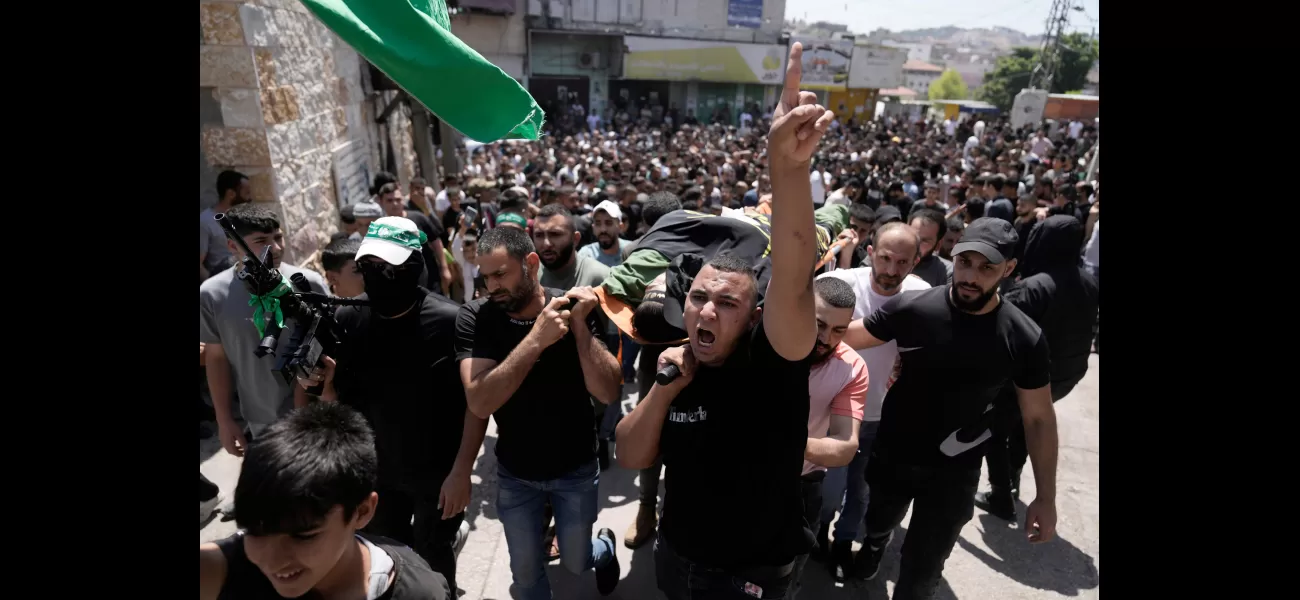Both Israelis and Palestinians have mixed feelings about the new cease-fire offer, with some optimism but also wariness.
Hopes rise in the Middle East as Israel and Hamas consider a potential cease-fire agreement.
June 14th 2024.

In the bustling city of Tel Aviv, Israel, there is a glimmer of hope amidst the chaos and destruction that has plagued the region for the past eight months. A proposed cease-fire agreement between Israel and Hamas is generating optimism that the fighting may finally come to an end. This is especially meaningful for the displaced Palestinians who long to return to their homes and rebuild their lives. On the other side, Israelis are yearning for the release of the captives taken by Hamas.
The proposal, backed by the United States, is the latest effort to bring an end to the ongoing war in Gaza. While there are still significant obstacles to overcome, negotiations are currently underway to make this deal a reality. However, both Palestinians and Israelis are cautiously optimistic, as they have faced disappointment in the past. Hamas is determined to come out of this war victorious, while Israeli Prime Minister Benjamin Netanyahu has made it clear that he will not stop fighting until the group is completely destroyed.
Let's take a closer look at the hopes, fears, and expectations of some of the individuals in the region as they weigh the possibilities of a potential deal.
The Palestinians in Gaza have been hit hard by the war, with 80% of the population being displaced and much of the city's infrastructure being destroyed. The constant violence and uncertainty have taken a toll on their mental and physical well-being. Salama Abu al-Qumbuz, a displaced person staying in the town of Deir al-Balah, expressed the sentiments of many when she said, "We want a solution. We want to return to our homes. We are tired of this life." The death toll on the Palestinian side has surpassed 37,000, with most people losing at least one family member and some losing dozens.
The war has deepened the despair in Gaza, with the failed attempts at a cease-fire only adding to the hopelessness. Etaf Abdel Bari, another displaced person, stated, "They negotiated a lot, to no avail. We are not a toy in their hands." This sentiment is shared by many who have lost faith in the negotiations.
In Israel, the families of the hostages held by Hamas and other groups are eagerly awaiting a deal. The attack by Hamas in October left 250 people in captivity, and although some were released in November, 80 are still being held, along with the remains of 40 others. The families have been in agony, not knowing the fate of their loved ones for the past eight months. They have been gathering weekly to protest and demand a deal, as it is their only hope of seeing their family members again. The Israeli public also views the release of the hostages through a deal as a top priority.
Shahar Mor Zahiro, whose uncle is being held hostage, expressed his fear that this deal may also fall through, like the previous ones. He said, "We already have like six or seven cycles of hope and despair, hope and despair, but what can we do? We are clinging on to any hope there is." Despite the widespread support for a deal, there are some families who oppose it as they do not want to see Hamas remain in power.
Eitan Zeliger, the director of the Tikva Forum, which represents about 30 hostage families, believes that the only way to free their loved ones is through military pressure on Hamas. He stated, "It is long and hard and hell for many hostage families. But the families we are in touch with understand that there is no way to return the hostages without war."
In the aftermath of the attack, the Israeli public stood firmly behind the military as they called up hundreds of thousands of reservists to fight against Hamas. However, some voices are emerging, including those of the mothers of soldiers, who accuse Netanyahu of prolonging the war for his own political gain. Noorit Felsenthal Berger, whose son has been in Gaza for eight months, expressed her frustration and stated, "I don't believe the decision-makers. I think we need to stop and we have a historic opportunity here." She believes that this is the time to end the war and move towards a peaceful resolution.
There is a growing concern that the postwar period may bring about investigations into the government's failures before the attack in October. This could potentially lead to new elections, which could further damage Netanyahu's already declining popularity. The army has suffered over 600 casualties in this war, and the pressure from the mothers of soldiers has previously played a significant role in ending previous conflicts. However, there has been a lack of a similar movement in this war, possibly because there are other relatives of soldiers who support continuing the fight and are opposed to a deal that would leave Hamas in power.
The Gvura Forum, which represents families of soldiers killed in the war, wrote a letter to Netanyahu expressing their opposition to the proposed deal. They believe that accepting this deal would mean surrendering to Hamas without achieving the goals of the war. The letter stated, "We will not agree that our loved ones serve as a silver platter on which the rule of terror returns to Gaza." It is evident that there are differing opinions within the families of soldiers, with some advocating for a deal and others wanting to continue the fight.
As negotiations continue, both Palestinians and Israelis are holding onto hope for a peaceful resolution. However, with past disappointments and conflicting opinions, it remains to be seen if this proposed cease-fire deal will be the solution to end the suffering and bring about lasting peace in the region.
The proposal, backed by the United States, is the latest effort to bring an end to the ongoing war in Gaza. While there are still significant obstacles to overcome, negotiations are currently underway to make this deal a reality. However, both Palestinians and Israelis are cautiously optimistic, as they have faced disappointment in the past. Hamas is determined to come out of this war victorious, while Israeli Prime Minister Benjamin Netanyahu has made it clear that he will not stop fighting until the group is completely destroyed.
Let's take a closer look at the hopes, fears, and expectations of some of the individuals in the region as they weigh the possibilities of a potential deal.
The Palestinians in Gaza have been hit hard by the war, with 80% of the population being displaced and much of the city's infrastructure being destroyed. The constant violence and uncertainty have taken a toll on their mental and physical well-being. Salama Abu al-Qumbuz, a displaced person staying in the town of Deir al-Balah, expressed the sentiments of many when she said, "We want a solution. We want to return to our homes. We are tired of this life." The death toll on the Palestinian side has surpassed 37,000, with most people losing at least one family member and some losing dozens.
The war has deepened the despair in Gaza, with the failed attempts at a cease-fire only adding to the hopelessness. Etaf Abdel Bari, another displaced person, stated, "They negotiated a lot, to no avail. We are not a toy in their hands." This sentiment is shared by many who have lost faith in the negotiations.
In Israel, the families of the hostages held by Hamas and other groups are eagerly awaiting a deal. The attack by Hamas in October left 250 people in captivity, and although some were released in November, 80 are still being held, along with the remains of 40 others. The families have been in agony, not knowing the fate of their loved ones for the past eight months. They have been gathering weekly to protest and demand a deal, as it is their only hope of seeing their family members again. The Israeli public also views the release of the hostages through a deal as a top priority.
Shahar Mor Zahiro, whose uncle is being held hostage, expressed his fear that this deal may also fall through, like the previous ones. He said, "We already have like six or seven cycles of hope and despair, hope and despair, but what can we do? We are clinging on to any hope there is." Despite the widespread support for a deal, there are some families who oppose it as they do not want to see Hamas remain in power.
Eitan Zeliger, the director of the Tikva Forum, which represents about 30 hostage families, believes that the only way to free their loved ones is through military pressure on Hamas. He stated, "It is long and hard and hell for many hostage families. But the families we are in touch with understand that there is no way to return the hostages without war."
In the aftermath of the attack, the Israeli public stood firmly behind the military as they called up hundreds of thousands of reservists to fight against Hamas. However, some voices are emerging, including those of the mothers of soldiers, who accuse Netanyahu of prolonging the war for his own political gain. Noorit Felsenthal Berger, whose son has been in Gaza for eight months, expressed her frustration and stated, "I don't believe the decision-makers. I think we need to stop and we have a historic opportunity here." She believes that this is the time to end the war and move towards a peaceful resolution.
There is a growing concern that the postwar period may bring about investigations into the government's failures before the attack in October. This could potentially lead to new elections, which could further damage Netanyahu's already declining popularity. The army has suffered over 600 casualties in this war, and the pressure from the mothers of soldiers has previously played a significant role in ending previous conflicts. However, there has been a lack of a similar movement in this war, possibly because there are other relatives of soldiers who support continuing the fight and are opposed to a deal that would leave Hamas in power.
The Gvura Forum, which represents families of soldiers killed in the war, wrote a letter to Netanyahu expressing their opposition to the proposed deal. They believe that accepting this deal would mean surrendering to Hamas without achieving the goals of the war. The letter stated, "We will not agree that our loved ones serve as a silver platter on which the rule of terror returns to Gaza." It is evident that there are differing opinions within the families of soldiers, with some advocating for a deal and others wanting to continue the fight.
As negotiations continue, both Palestinians and Israelis are holding onto hope for a peaceful resolution. However, with past disappointments and conflicting opinions, it remains to be seen if this proposed cease-fire deal will be the solution to end the suffering and bring about lasting peace in the region.
[This article has been trending online recently and has been generated with AI. Your feed is customized.]
[Generative AI is experimental.]
0
0
Submit Comment





